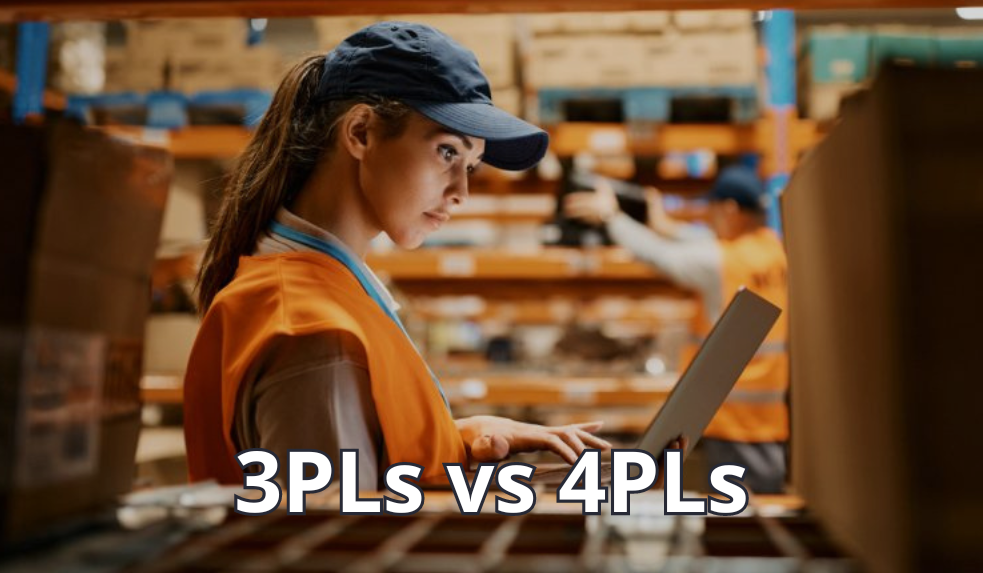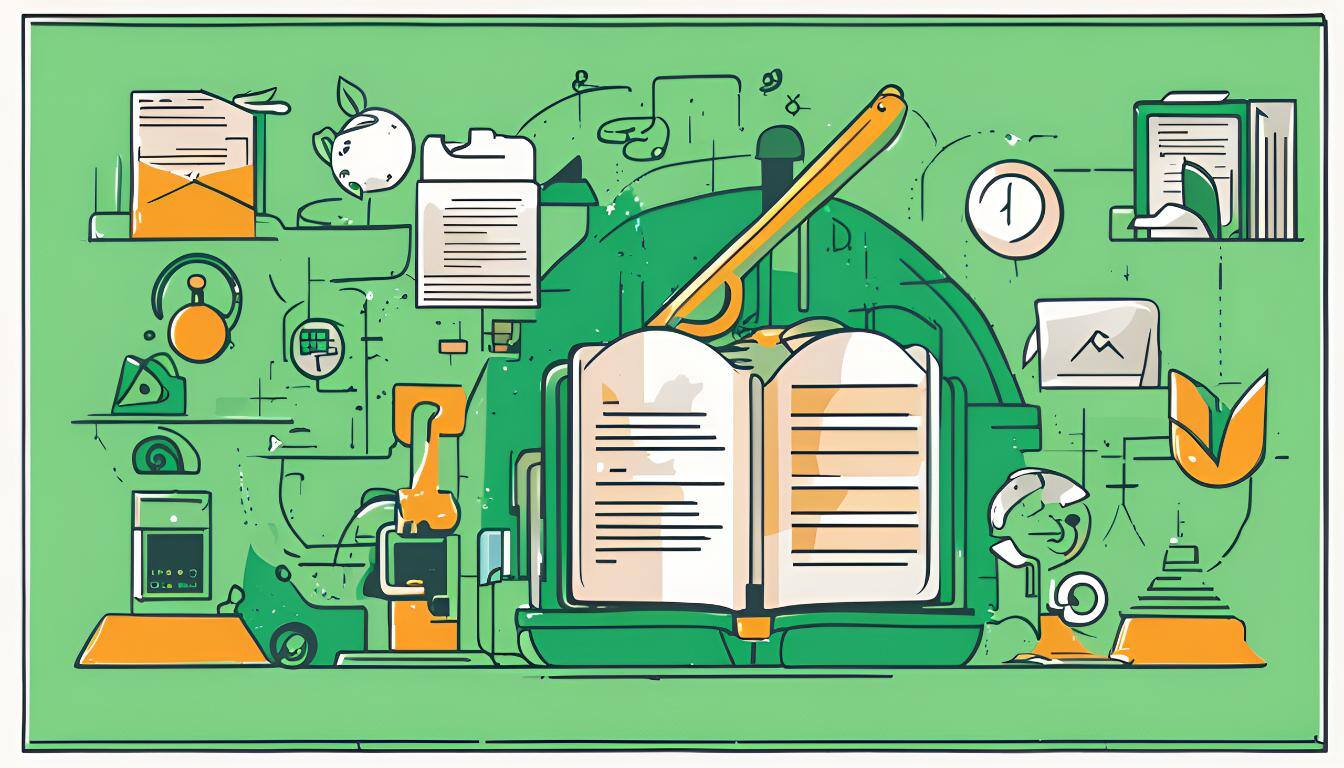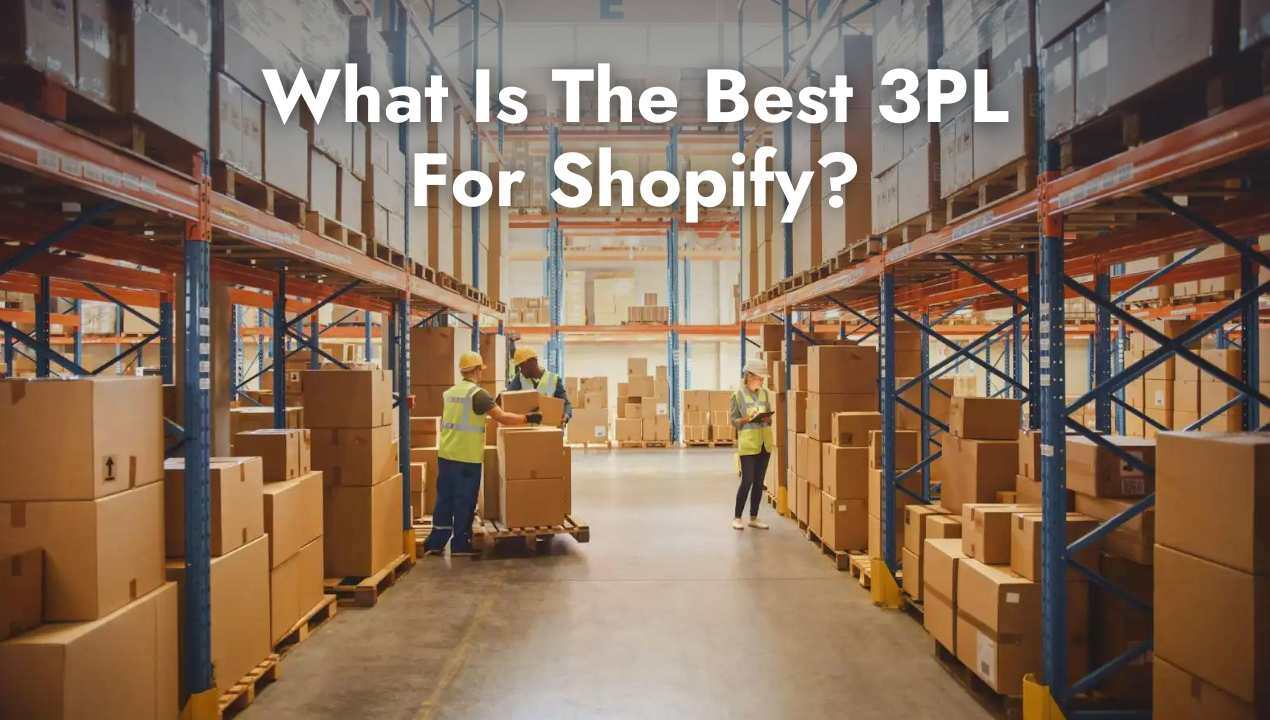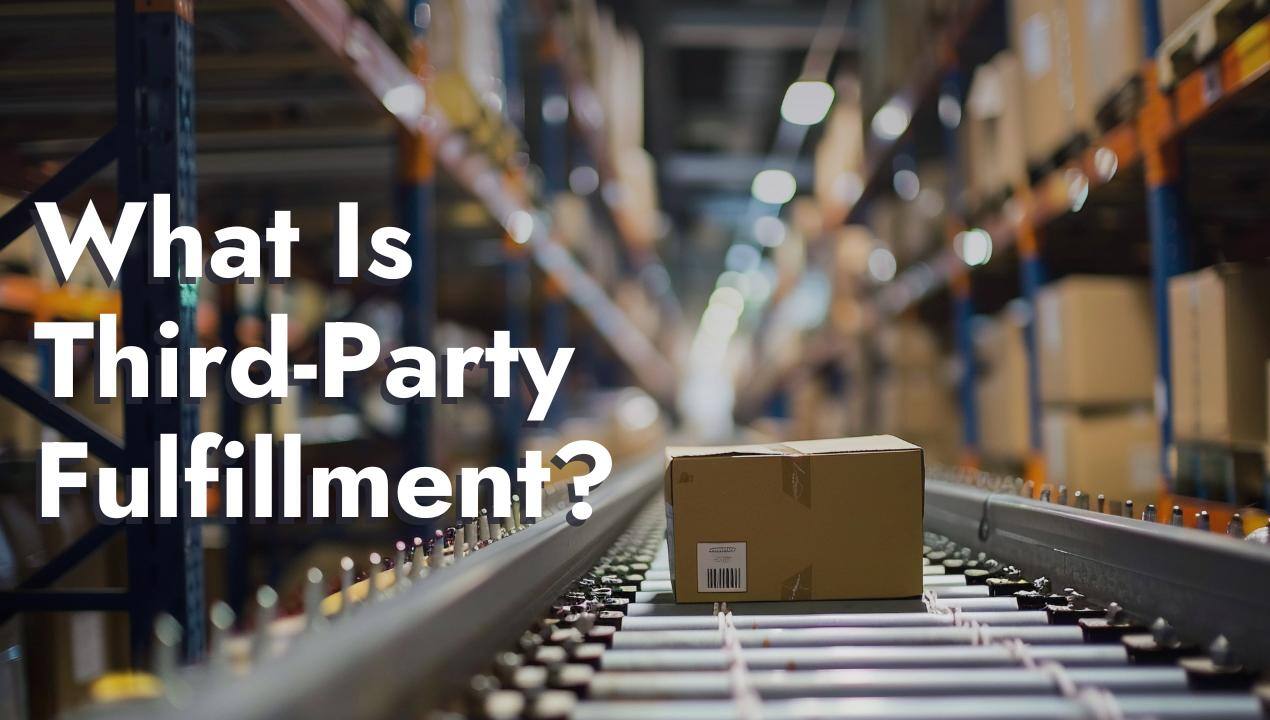Share this
3PL vs. 4PL: Which Is the Right Solution For Your Business?
by Kyla Friel on Mar. 14, 2024

Managing a growing ecommerce business demands effective logistics management to keep pace. Sometimes, keeping that pace becomes too challenging, resulting in a business stagnating instead of scaling. That’s why so many ecommerce businesses are able to grow further when they partner with a logistics provider – and the decision often comes down to partnering with a 3PL vs 4PL.
If your ecommerce business has been considering outsourcing your logistics, you have probably found yourself deciding between Third-Party Logistics (3PL) and Fourth-Party Logistics (4PL) providers. Though 3PLs and 4PLs function differently, they are both partners that handle essential logistics tasks, allowing you to concentrate on your core business functions.
But how do you make the right decision? Whether you're an established online retailer with eyes on new markets or a growing ecommerce startup eager to streamline operations, your company’s individual needs, goals, and operational complexities must guide your decision.
This guide is designed to provide a clear, in-depth analysis of both 3PLs and 4PLs. It's about understanding their roles, strengths, and potential challenges from a practical standpoint. After reading, you'll be better equipped to make an informed choice on the logistics partner that can best support and drive your business forward.
Differences Between a 3PL vs. 4PL
It's important to understand the distinctive differences in the roles each provider is responsible for when it comes to 3PLs vs 4PLs. Depending on what your business is looking for, the differences in functionalities are central to making an informed choice.
Both 3PLs and 4PLs are partners that offer outsourced fulfillment solutions. While 3PLs can be an end-to-end logistics partner, businesses can also hire 3PL providers to manage specific parts of their supply chain. This can include operational aspects like warehousing, transportation, order fulfillment, and inventory management. 3PLs can also customize fulfillment solutions according to your specific product requirements, including custom packaging and dunnage or storage solutions like cold chain.
While you delegate these operational aspects, you still maintain control over the overall logistics model and decision-making. You set the goals and objectives, and the 3PL executes the tasks accordingly. 3PLs are a great partner choice if you want to oversee your logistics operations closely but need help with specific components.
4PLs act as a single interface between your business and all other logistics providers. A 4PL manages the entire supply chain, including vendor management, strategic planning, performance optimization, and analytics.
When you partner with a 4PL, you delegate the strategic oversight and decision-making to a central entity. The 4PL manages and coordinates all logistics activities throughout the entire supply chain on your behalf. This can be beneficial if your supply chain is complex and you'd prefer experts to handle the strategic management of the whole operation.
However, this also means that you relinquish some control over individual logistics tasks and processes. Instead, your control comes in the form of setting overarching goals, performance indicators, and service level agreements. The 4PL executes and manages the entire logistics strategy to align with these objectives.
While both 3PLs and 4PLs can offer valuable support for logistics services, they do so in different ways. Choosing between a 3PL and a 4PL will depend on your needs, the complexity of your supply chain, and how much control you want to retain over your logistics.
Pros and Cons of Partnering With a 3PL
Partnering with a Third-Party Logistics provider can provide many benefits that help streamline your logistics and boost your business efficiency. Here are some key advantages that 3PL services can bring to your ecommerce business.
3PL Pros
Involvement and Communication
One of the primary advantages of working with a 3PL is the operational control you can maintain over your logistics. While not responsible for the execution of tasks, your team is still able to make decisions regarding specific logistics functions like warehousing, transportation, order fulfillment, and inventory management.
Benefits:
- Having constant insight into operations and the option to be more hands-on allows your team to continue to make the critical decisions that align with your business objectives.
- You can expect direct communication and transparency when working with 3PL companies, making it easy to track performance, solve problems quickly, and make sure services meet business goals.
- This transparency can boost your confidence in the logistics process, ensuring your operations run as smoothly and efficiently as possible.
Flexibility and Scalability
One huge benefit of partnering with a 3PL over a 4PL is their flexibility and tailor-made fulfillment solutions. When you partner with a 3PL, you can choose the services that best serve your business needs.
Benefits:
- This flexibility allows you to create a logistics solution that perfectly aligns with your operational model, budget constraints, and overall strategic goals.
- For instance, if your business needs expert assistance in warehousing and transportation but prefers to manage customer relations in-house, a 3PL can work with your business to come up with a warehousing and transportation strategy without involving any departments you don’t want to outsource.
- This allows your business to have control over some critical areas while outsourcing others to trusted experts.
- This flexibility extends to scalability as well. You can easily add services, adjust volumes, or expand into new geographic areas with your logistics partner.
- This scalability becomes extremely valuable when launching new products, entering new markets, or dealing with seasonal demand fluctuations.
Owned Logistics Assets
A 3PL that owns its own logistics assets can utilize them more effectively than a 4PL. Logistics assets often include warehouses, trucks, distribution centers, and proprietary technology or software. Because 3PLs own and directly operate these assets, they have more control over their usage.
Benefits:
- An added level of control and reliability. 3PLs maintain their owned assets and ensure they are available when needed, guaranteeing the safe and efficient storage of your products.
- This allows for greater flexibility and responsiveness in managing the day-to-day logistics operations. For instance, if there's a sudden surge in demand, a 3PL with its own warehouses can accommodate scaling more easily than a 4PL, which might have to negotiate extra space with another provider. Similarly, a 3PL with its own fleet of vehicles could more readily adjust transport schedules or routes in response to changes in circumstances.
Since 4PLs specialize in managing and coordinating the resources of multiple other providers, they normally don’t maintain any of their own assets. However, be careful to make sure that the 3PL you partner with actually does own their assets.
Seamless Logistics and Ecommerce Integration
It is often easier for an ecommerce business to integrate with a 3PL than a 4PL because of their expertise in specific operational tasks. Since these activities are more tangible and specific, companies can integrate them into their existing systems quickly and easily. Because a 4PL manages different partners to coordinate the whole supply chain, it can be harder to integrate with your company’s existing processes. This can be a crucial factor for businesses that need to scale their operations swiftly.
3PLs also offer a less complicated stakeholder landscape. With a 3PL, you primarily deal with one provider for certain services, resulting in fewer parties involved in the implementation process. On the other hand, a 4PL manages multiple logistics providers, potentially complicating and lengthening the implementation timeframe. Many 3PLs also have standardized processes and technologies they use across multiple clients, making technological integration easier.
For ecommerce businesses, technological integration should absolutely be a key factor in a future partnership. Don’t forget to check if the 3PL you’re partnering with offers integrations with popular ecommerce platforms. For example, partnering with a 3PL that already offers a seamless Shopify fulfillment solution is critical for a business that uses the platform and wants to make sure order fulfillment can start as quickly as possible.
3PL Cons
Integration and Coordination
Working with any outsourced logistics partner could potentially present challenges when it comes to integration and coordination. As a business, your existing systems and operations might be specialized or complex, making it difficult to seamlessly incorporate outside services. Ensuring effective collaboration and maintaining regular communication is essential to navigating these challenges. You'll need to work closely with your chosen 3PL to align your processes and systems and facilitate smooth operations.
If your ecommerce business uses unique inventory management systems or customized customer relationship management (CRM) tools, a 3PL that offers its own proprietary technology can offer flexible solutions to integrate with your existing systems. A tech-enabled 3PL that can customize its technology to fit your operations can enable smoother integration, minimizing disruption to your current processes.
As an example of specific processes, if your business sells items that have an expiration date, the FDA requires you to implement lot tracking. You should make sure the 3PL you’re considering partnering with can accommodate this need. To overcome these challenges, you should ensure that the 3PL is fully briefed on your requirements and demonstrates a clear understanding of your processes.
Communication
As 3PLs take over specific logistics functions, maintaining robust lines of communication is critical. For example, if a customer's order is delayed, you’ll want to be informed immediately. If there's a bottleneck in the supply chain, your 3PL partner should inform you promptly.
Setting up clear communication channels and expectations is essential. You should choose a 3PL that offers dedicated account management to ensure you always have this direct line of communication. With the right 3PL, your account manager will notify you immediately if there's an issue, like a delay in shipping due to inclement weather, to help you adjust expectations with your customers accordingly.
On top of that, transparency in inventory and order updates is a critical aspect of communication. A good 3PL provider should offer real-time inventory and order status reporting. This would allow you to check the status of any order at any time, helping you manage customer demands and expectations and resolve any potential issues before they escalate.
Having a dedicated account manager and real-time inventory and order status visibility creates a transparent and effective communication pathway between your business and its 3PL partner. This helps ensure the smooth operation of your logistics and, most importantly, the satisfaction of your customers. As such, when choosing a 3PL, it's essential to prioritize those that offer these services.
Pros and Cons of Partnering With a 4PL
If your business has complex logistics needs and requires oversight of the whole supply chain, a Fourth-Party Logistics provider might be the right choice. Here's a deeper look into the potential benefits of opting for a 4PL provider.
4PL Pros
Strategic Oversight & Centralized Coordination
Instead of managing individual logistics tasks, a 4PL manages the strategic oversight of your entire supply chain. While this means less control over each task, it also presents the opportunity to gain a higher-level view of your supply chain. This allows you to see the broader picture of your logistics performance, enabling you to make informed strategic decisions.
Working with a 4PL means centralizing the coordination of your supply chain. The primary control your business will keep lies in decision-making and oversight. You can set key performance indicators (KPIs), establish service level agreements (SLAs), and make strategic decisions in collaboration with the 4PL.
End-to-End Visibility
A 4PL also gives you end-to-end visibility into your supply chain solutions. This high-level control over the entirety of the supply chain allows you to understand overall performance and make data-driven strategic decisions.
Vendor Management
Managing multiple vendor relationships can be time-consuming and complex. As the single point of contact for all logistics providers, a 4PL handles these vendor relationships on your behalf. While this means less control over daily interactions with individual providers, it can be more convenient to have a 4PL select, manage, and optimize the performance of these vendors. This might lead to better vendor relationships, improved efficiency, and potential cost savings.
4PL Cons
Trust and Coordination
The decision to outsource your entire supply chain management to a 4PL demands a high level of trust. This is because the entire oversight of your supply chain, from logistics to vendor relationships, will be managed by the 4PL. Effective coordination and seamless information flow between the 4PL and other logistics providers are crucial to ensure smooth operations. You must establish clear communication channels and processes for sharing information and updates.
Imagine a sudden strike at a port disrupts your supply chain. In such a scenario, your 4PL would be responsible for re-routing shipments, coordinating with other logistics providers, and minimizing the impact on your business. You have to rely on them to act in your best interest and handle issues promptly.
Furthermore, since 4PLs manage multiple partners and vendors, you must trust them to establish effective coordination and seamless information flow. For instance, if a supplier fails to meet a delivery deadline, the 4PL should swiftly communicate this to the relevant freight forwarder and adjust the logistics plan accordingly. Clear communication channels and processes need to be established to ensure this level of coordination.
4PLs typically take on a more strategic role. They oversee and coordinate the entire supply chain and handle tasks such as supply chain strategy and optimization, coordination of multiple logistics providers, and data analysis.
While a 4PL can offer a holistic view of the supply chain, businesses working with a 4PL may not be as involved in the day-to-day logistics operations. They delegate this oversight to the 4PL, which then manages other logistics providers (which might include 3PLs) to execute the operations. This model may offer benefits in terms of broad strategy and efficiency, but it also means less opportunity for involvement for your business. This could be a negative for companies with more complicated fulfillment needs.
Cost Considerations
While 4PLs offer end-to-end solutions, these typically come at a higher cost compared to outsourcing specific tasks to a 3PL. Businesses must thoroughly evaluate the cost-benefit ratio of a 4PL's services and assess the potential impact on the bottom line. It's essential to consider both the immediate cost implications and the long-term value added through improved efficiency and optimization.
Provider & Vendor Management
When a 4PL handles both logistics providers and vendors, the complexity of those relationships is magnified. It’s essential for your ecommerce business to understand and be aware of the intricacies involved – and the complications that could occur.
A 4PL needs to make sure logistics providers align with the broader supply chain strategy. It's a careful balancing act between efficiency, cost, and performance. Clear performance metrics, service level agreements (SLAs), and regular check-ins are crucial.
If something goes awry—like if there's a lack of coordination between warehouse and transportation providers that causes a bottleneck in product movement—you could see delays. And with information traveling through several channels before reaching your business, you might not be aware of those issues in time to adjust.
Managing different vendors around the globe is another layer of complexity. A 4PL might be responsible for coordinating suppliers from various regions, each with unique contractual agreements, payment terms, and delivery schedules. Aligning them all in a unified strategy can prove challenging. One unexpected delay from a supplier can trigger a chain reaction across your supply chain, a scenario a 4PL would need to mitigate while keeping communication smooth between partners and your company.
Lastly, there's the matter of control. Outsourcing all vendor management to a 4PL might make things more efficient, but it might also mean losing some direct influence over those relationships. It's possible that a 4PL's broader perspective could miss details important to your specific business.
For example, a 4PL might negotiate a contract with a vendor known for delays in an effort to save costs, a decision that could cause issues down the line. Or if a 4PL doesn't properly manage a crucial supplier, you might face stock shortages, directly hitting your ability to fulfill orders.
Broad Scope vs. Specialized Expertise
While a 4PL's broad oversight of the entire supply chain may present an attractive, unified solution, it comes with certain caveats. A 4PL's role primarily involves managing and coordinating various logistics functions and vendors. Oftentimes, they are more inclined to identify and select more generic, one-size-fits-all solutions from different providers in their network that may not necessarily align with your specific business needs.
The lack of specialized expertise on a 4PL's part can lead them to lean towards these more standard solutions. If these choices don't fit your unique requirements, going back to the 4PL to re-coordinate and find better, more tailored solutions can become a complex and time-consuming process. They might not have the in-depth knowledge to quickly pinpoint alternative providers that can offer the specialized services you need.
In contrast, working directly with a 3PL that focuses on specific logistics functions such as warehousing or transportation means you are collaborating with a partner that has deep expertise in those areas. They understand the nuances and can craft custom solutions tailored to your exact requirements. If adjustments are needed, a 3PL can typically respond more agilely, tweaking the solutions in real-time, something that might be more challenging for a 4PL that has to navigate a network of different providers.
While a 4PL's ability to manage the entire supply chain may seem convenient, their role as 'middlemen' and lack of specialization may lead them to solutions that are more generic. This can pose risks to businesses that require specialized services, and it may become challenging to rectify misalignments. On the other hand, a 3PL offers hands-on expertise and the ability to directly create and modify solutions, resulting in a more tailored fit for your specific needs.
Should your ecommerce business partner with a 3PL vs 4PL?
You’re now an expert on the differences between 3PLs vs. 4PLs and the benefits of partnering with each. For the majority of growing ecommerce businesses, partnering with a 3PL is the way to go, striking the perfect balance between efficiency, cost-effectiveness, and scalability.
As you navigate the complexities of expanding your operations, consider the tailored support, expertise, and resource flexibility that a 3PL can offer. It’s an investment in your company's future, designed to adapt to your evolving needs and free you to focus on what you do best: building your brand and expanding your market reach.
Partnering with a top-rated 3PL like Shipfusion means you get access to on-site, dedicated account management, white glove ecommerce integration, and turnkey fulfillment solutions that can take the pressure off while you focus on growing your business. With seamless platform integrations, a white-glove onboarding process, and dedicated Account Managers, we’ve got your logistics covered every step of the way.
If you’re ready to learn more about finding a solution that optimizes your order fulfillment, book an appointment to speak with a Shipfusion fulfillment specialist today.
Share this
You May Also Like
These Related Articles

The Key Ingredients of a Successful 3PL Agreement and Partnership

What Is The Best 3PL For Shopify?

What Is Third Party Fulfillment?
- May 2025 (8)
- April 2025 (27)
- March 2025 (26)
- February 2025 (26)
- January 2025 (37)
- December 2024 (16)
- November 2024 (23)
- October 2024 (22)
- September 2024 (27)
- August 2024 (9)
- July 2024 (8)
- June 2024 (5)
- May 2024 (8)
- April 2024 (8)
- March 2024 (6)
- February 2024 (6)
- January 2024 (5)
- December 2023 (3)
- November 2023 (3)
- October 2023 (5)
- September 2023 (4)
- August 2023 (2)
- July 2023 (1)
- June 2023 (4)
- March 2023 (2)
- October 2022 (1)
- September 2022 (5)
- August 2022 (4)
- July 2022 (7)
- June 2022 (4)
- May 2022 (4)
- April 2022 (6)
- March 2022 (2)
- February 2022 (1)
- January 2022 (3)
- December 2021 (2)
- November 2021 (4)
- October 2021 (2)
- September 2021 (5)
- August 2021 (4)
- July 2021 (4)
- June 2021 (3)
- May 2021 (2)
- April 2021 (3)
- March 2021 (3)
- February 2021 (3)
- January 2021 (2)
- December 2020 (4)
- November 2020 (2)
- October 2020 (4)
- September 2020 (2)
- July 2020 (5)
- June 2020 (4)
- May 2020 (2)
- April 2020 (2)
- March 2020 (4)
- February 2020 (1)
- December 2019 (1)
- May 2018 (1)
- March 2018 (2)
- February 2018 (3)
- January 2018 (3)
- November 2017 (3)
- July 2017 (4)
- March 2017 (3)
- February 2017 (5)
- January 2017 (3)
- December 2016 (4)
- November 2016 (6)
- October 2016 (6)
- October 2015 (1)
- September 2015 (1)
- June 2015 (3)
- May 2015 (3)
- August 2014 (1)
- July 2014 (1)
- March 2014 (1)
- February 2014 (1)